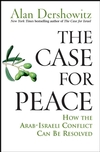 I recently read Alan Dershowitz's new book The Case for Peace and was somewhat surprised by it (here's a link to an article about Dershowitz's recent debate with Noam Chomsky on this subject). Dershowitz attempts to map out a workable peace plan, emphasizing that both sides will need to compromise and giving specific suggestions on what is necessary for each side to abandon and on what issues there is room for discussion. Additionally, he brings to light a number of very creative solutions to some of the thorniest problems. For example, regarding the lack of contiguity between Gaza and the West Bank that would make uniting the two in one country difficult, he reports that a monorail system has been designed to connect the two without allowing stops in Israel. He also points out that certain major Israeli cities within the West Bank, such as Maaleh Adumim, are entirely non-negotiable, as is a total right of return to Israel for Palestinians.
I recently read Alan Dershowitz's new book The Case for Peace and was somewhat surprised by it (here's a link to an article about Dershowitz's recent debate with Noam Chomsky on this subject). Dershowitz attempts to map out a workable peace plan, emphasizing that both sides will need to compromise and giving specific suggestions on what is necessary for each side to abandon and on what issues there is room for discussion. Additionally, he brings to light a number of very creative solutions to some of the thorniest problems. For example, regarding the lack of contiguity between Gaza and the West Bank that would make uniting the two in one country difficult, he reports that a monorail system has been designed to connect the two without allowing stops in Israel. He also points out that certain major Israeli cities within the West Bank, such as Maaleh Adumim, are entirely non-negotiable, as is a total right of return to Israel for Palestinians.
Importantly, he notes the significant barrier to peace that external parties pose. In particular, he points to academics and liberals. They demonize Israel for its "occupation" of Palestine and criticize it for its human rights violations, without pointing to others who are more blatantly occupying the land of others and violating human rights (e.g. China and Tibet). This unfair distortion of reality to make Israel into the worst country in the world is not only unfair and causes economic damage to Israel based on false premises, it is a deterrent to peace.
However, despite Dershowitz's contagious optimism and his extreme realism, I left the book puzzled. The question kept coming to my mind, "Why?" Why would Israel agree to this plan or any variation of it? The Palestinians want a state, so they will have to agree to something. But why would Israel need to compromise? The answer, of course, is war and terrorism. Israel wants peace; the Palestinians want independence. The proposed plan will give Palestinians an independence that, short of a protracted war that would cripple Israel internationally, is essentially irrevocable. Agreeing to the plan will give Palestinians most of what they want. But will Israel get what it wants?
I was surprised to see that Dershowitz devoted only one short chapter of three pages to the cessation of terrorism. His answer is basically that we'll have to work on ensuring it. But how? How will Israel be guaranteed that terrorism will stop? Perhaps the Palestinian government will focus on building its own country and allow the terrorists to do whatever they want in exchange for not interfering in building infrastructure. Maybe the government itself will help the terrorists. What guarantees can Israel receive that terrorism will stop?
I fully support creating a Palestinian state and compromising on many important issues if, and only if, terrorism is guaranteed to stop. But that is the single most important point and is a deal-killer. Without that absolute guarantee, there should not be any deal.
Personally, I can't think of any way to create the absolute cessation of terrorism but if Dershowitz can apply his ample creativity to this problem, perhaps he will indeed arrive at a case for peace. For now, however, all he has proposed is a case for Palestine.
Tuesday, December 13, 2005
A Case for Peace
 9:27 PM
9:27 PM
 Gil Student
Gil Student